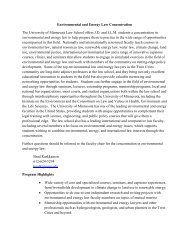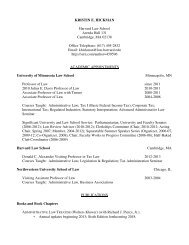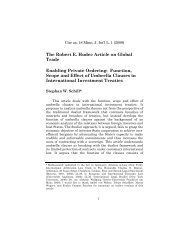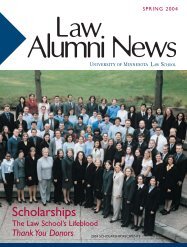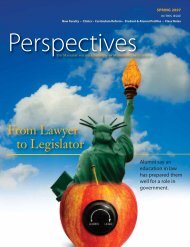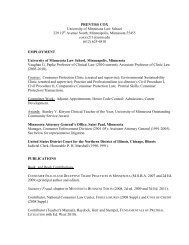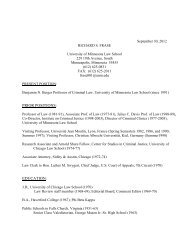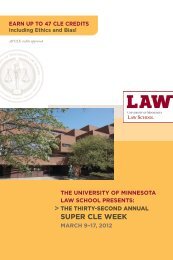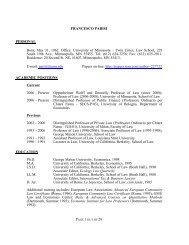The End-of-Life Vehicle (ELV) - the University of Minnesota Law ...
The End-of-Life Vehicle (ELV) - the University of Minnesota Law ...
The End-of-Life Vehicle (ELV) - the University of Minnesota Law ...
You also want an ePaper? Increase the reach of your titles
YUMPU automatically turns print PDFs into web optimized ePapers that Google loves.
2009] END-OF-LIFE VEHICLE DIRECTIVE 451<br />
programs that shift responsibility for waste management from<br />
municipalities to producers. 149 However, <strong>the</strong> United States has<br />
diverged from international norms in waste management. 150<br />
<strong>The</strong>re are several problems with <strong>the</strong> current American model <strong>of</strong><br />
automotive waste treatment and disposal. While <strong>the</strong> EU <strong>ELV</strong><br />
Directive could not be transferred to <strong>the</strong> United States<br />
verbatim, an EPR-styled system <strong>of</strong> <strong>ELV</strong> disposal has many<br />
benefits.<br />
In <strong>the</strong> early 1990s, federal legislation, in <strong>the</strong> form <strong>of</strong><br />
proposed National Recycling Act, would have imposed a<br />
uniform, national obligation on producers. 151 However,<br />
supporters, such as <strong>the</strong> non-governmental National Resources<br />
Defense Council, were no match for overwhelming industry<br />
opposition. 152 Since <strong>the</strong> failure <strong>of</strong> <strong>the</strong> National Recycling Act,<br />
developments in waste management have had two defining<br />
characteristics. First, states have now taken <strong>the</strong> initiative <strong>of</strong><br />
increased waste responsibility. 153 Second, “product<br />
responsibility,” which had been defined as “a voluntary system<br />
that ensures responsibility for <strong>the</strong> environmental effects<br />
throughout a product’s life cycle by all those involved in <strong>the</strong> life<br />
cycle” was replaced by <strong>the</strong> “Product Stewardship” model, a<br />
compromise between amorphous shared responsibility and<br />
focused producer responsibility. 154 By <strong>the</strong> late 1990s, most<br />
federal legislative pressure for waste disposal responsibility had<br />
waned, 155 perhaps in large part because <strong>of</strong> <strong>the</strong> abatement <strong>of</strong> <strong>the</strong><br />
149. See id. at 205–12 (noting that government management is minimal; ra<strong>the</strong>r,<br />
producers are responsible for implementation and management <strong>of</strong> waste facilities);<br />
see also JAPANESE EXTERNAL TRADE ORG. (JETRO), CAR RECYCLING BUSINESS IN<br />
JAPAN (2006) (discussing Japan’s <strong>End</strong>-<strong>of</strong>-life <strong>Vehicle</strong> Recycling <strong>Law</strong>).<br />
150. Sheehan & Spiegelman, supra note 7, at 215.<br />
151. Id. at 213. This legislation did not impose take backs, but ra<strong>the</strong>r focused on<br />
standards that obligated producers to develop end markets for recycled materials.<br />
152. Id.<br />
153. Id. at 213–15. Specific examples <strong>of</strong> state legislation can be found above.<br />
See also Short, supra note 27, at 1242–44.<br />
154. Sheehan & Spiegelman, supra note 7, at 214–16. In fact, <strong>the</strong> defining<br />
characteristic <strong>of</strong> most state legislation is <strong>the</strong> absence <strong>of</strong> legal responsibility, financial<br />
or physical, assigned to producers. Id. at 214. This setup is sometimes referred to<br />
as ‘Environmental Federalism’. See generally R. Daniel Keleman, Environmental<br />
Federalism in <strong>the</strong> United States and <strong>the</strong> European Union, in GREEN GIANTS?<br />
ENVIRONMENTAL POLICIES OF THE UNITES STATES AND EUROPEAN UNION 113<br />
(Norman J. Vig & Michael G. Faure, eds., <strong>The</strong> MIT Press 2004).<br />
155. See Sheehan & Spiegelman, supra note 7, at 215. However, in <strong>the</strong> early<br />
part <strong>of</strong> <strong>the</strong> new millennium, grass roots organizations reignited public attention for<br />
EPR, especially in <strong>the</strong> fields <strong>of</strong> hazardous and electronic waste. Id. at 216–19. It<br />
appears this pressure is being felt in <strong>the</strong> legislature. See generally U.S. GAO,



